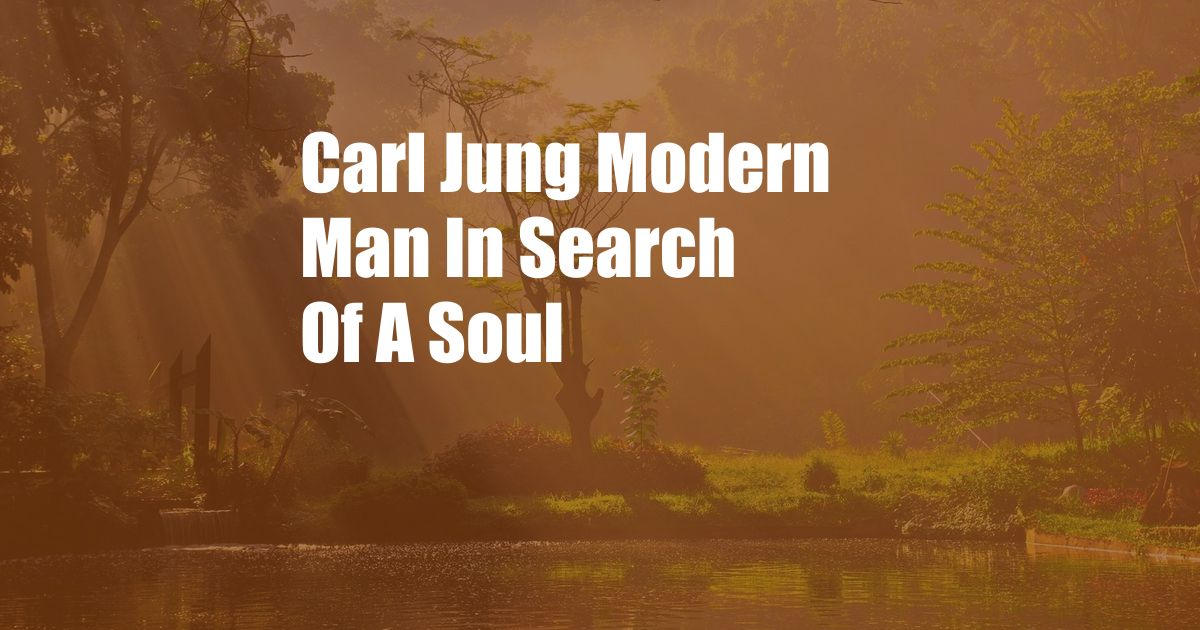
Carl Jung’s “Modern Man in Search of a Soul”
In a world characterized by rapid technological advancements and societal shifts, the human soul often seems lost and adrift. In his seminal work “Modern Man in Search of a Soul,” Carl Jung delves into the profound psychological struggles and longing for meaning that afflict contemporary individuals.
Jung’s exploration of the modern psyche reveals a deep crisis of the soul, characterized by alienation, isolation, and a sense of purposelessness. He argues that the relentless pursuit of material wealth and external validation has led to a neglect of the inner life, resulting in a profound disconnection from our true selves.
The Shadow and the Unconscious
Central to Jung’s analysis is the concept of the “shadow,” a reservoir of repressed emotions, instincts, and desires that lie dormant in the unconscious. Modern society, with its emphasis on rationality and social conformity, often suppresses and denies the shadow, leading to psychological fragmentation and inner conflict.
Jung believed that confronting and integrating the shadow was essential for the development of a healthy psyche. By acknowledging and reconciling our hidden aspects, we can achieve greater self-awareness and wholeness, freeing us from the burden of unresolved conflicts.
Individuation and the Self
Jung’s theory of individuation emphasizes the journey of self-discovery and realization that leads to the integration of the personality’s various aspects. This process, which Jung famously described as a “process of wholeness,” involves the development of a strong and integrated sense of self that encompasses both conscious and unconscious elements.
Through individuation, we come to embrace our unique qualities, strengths, and limitations, accepting the totality of our being and finding meaning and purpose in life. Jung believed that individuation was the ultimate goal of human development and the key to a fulfilling and authentic life.
The Collective Unconscious and Archetypes
Jung’s concept of the collective unconscious goes beyond the individual psyche, suggesting the existence of a shared reservoir of experiences, images, and symbols that transcends cultural and personal boundaries. Within this collective unconscious lie archetypes, universal patterns and themes that manifest in the dreams, myths, and cultural expressions of all human societies.
Archetypes, such as the hero, the wise old man, and the mother, provide a framework for understanding our own experiences and connect us to our shared human heritage. By exploring and understanding archetypes, we can gain insights into our own motivations, behaviors, and relationships, promoting a deeper sense of meaning and belonging.
Latest Trends and Developments
Jung’s ideas continue to resonate with contemporary readers, inspiring research and discussion in the fields of psychology, philosophy, and spirituality. Recent developments in neuroscience have provided empirical evidence for the existence of the unconscious mind and the role of archetypes in shaping human behavior.
Moreover, the growing emphasis on mindfulness and self-awareness in modern society has led to a renewed interest in Jung’s teachings. His exploration of the inner world and the search for meaning offer valuable guidance for navigating the complexities of the 21st century.
Tips and Expert Advice
Embrace your shadow: Acknowledge and accept the darker and less acceptable aspects of yourself, rather than suppressing or denying them.
Cultivate self-reflection: Dedicate time to introspection and journaling, exploring your thoughts, emotions, and motivations to gain a deeper understanding of yourself.
Connect with your dreams: Dreams provide a window into the unconscious mind, offering valuable insights into your inner life and personal development.
Explore archetypes: Familiarize yourself with archetypal symbols and themes, and examine how they manifest in your own experiences, relationships, and cultural narratives.
Seek guidance from a therapist: If you struggle with psychological issues or feel lost in your search for meaning, consider seeking professional help from a therapist who can provide support and guidance on your journey.
FAQs
Q: What is the main idea of Jung’s “Modern Man in Search of a Soul”?
A: Jung argues that modern individuals have lost touch with their inner selves, leading to a crisis of the soul characterized by alienation, isolation, and purposelessness.
Q: How does Jung define the “shadow”?
A: The shadow refers to the repressed aspects of the personality, including negative emotions, instincts, and desires that are hidden from consciousness but continue to influence our behavior.
Q: What is individuation?
A: Individuation is a lifelong process of self-discovery and realization that aims to integrate the various aspects of the personality, leading to a strong and authentic sense of self.
Q: What is the significance of the collective unconscious?
A: The collective unconscious is a shared reservoir of experiences, images, and symbols that transcends cultural and personal boundaries, containing universal patterns known as archetypes.
Q: How can Jung’s ideas help me in my life?
A: Jung’s teachings offer valuable guidance for understanding yourself, confronting your inner challenges, and finding meaning and purpose in life.
Conclusion
Carl Jung’s “Modern Man in Search of a Soul” remains an invaluable exploration of the human psyche and the search for meaning in an ever-changing world. His insights into the shadow, the unconscious, and the importance of individuation continue to inspire and guide individuals seeking to live authentic and fulfilling lives.
If you are wrestling with a sense of emptiness or longing, I invite you to delve into Jung’s work and embark on your own journey of self-discovery. By confronting our shadows, embracing our unconscious, and pursuing individuation, we can reclaim our lost souls and find the purpose and fulfillment we seek.